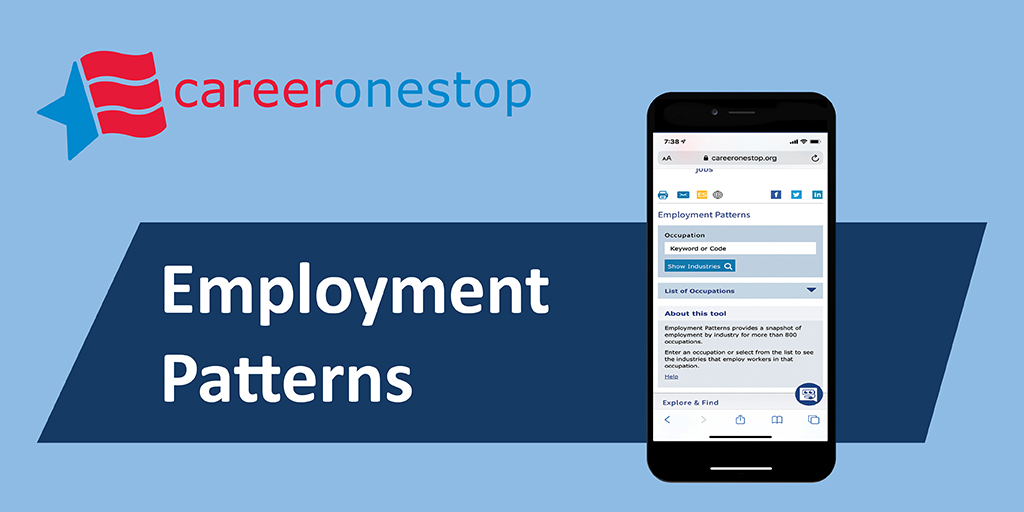

Whether you are a student looking for a career path that doesn’t require a 4-year degree, or a school counselor helping students find one, you can use CareerOneStop to develop a plan for a future career. Explore how different careers might fit, learn about job outlook and what employers are looking for, and identify education and training options available in your local area.
1 Identify possible careers that fit your interests
Start with an interest assessment to get ideas for careers that fit your interests, or what you like to do. Your results will show you a list of careers; use the “Experience or education needed” filter to see your best-fit occupations at the level of education you prefer.
Next you can select any job title in your results to see details on the career description and watch a video to learn more about life on the job.
2 Learn about the requirements and details of a career before you invest money or time into your education.
Once you’ve selected some careers to research further, you can compare some of the important details about them. Use the Occupation Profile to research answers to the following key questions and eliminate careers that don’t fit your goals:
• What’s the job outlook for the career that your training will lead to?
• What type of education does this occupation typically require?
• How many new jobs are expected in coming years?
• What’s the usual salary?
• What skills, knowledge, and abilities are used in the career?
3 Explore education and training options.
To further refine your career ideas, learn about the different types of education and training that are available, so you can make an informed decision for your future. Here are the major options to consider.
Apprenticeship
Apprenticeships are full-time jobs with built-in training that prepare workers to enter in-demand careers. They can provide an affordable way to build a high-paying career without the student debt that can add up for college students.
Apprenticeships are sponsored by employers, unions, and professional associations in fields such as information technology, finance and business, healthcare, hospitality, transportation, and manufacturing.
Visit the Apprenticeship Finder on Apprenticeship.gov to see opportunities that have been advertised in your area.
Associate’s degree
The associate’s degree typically takes two years of full time college to complete and can prepare you to enter a career, or apply toward an eventual 4-year degree. Explore associate’s degree programs in your area using the Local Training Finder.
• Enter your occupation of interest and your location
• Filter results by using the filter, Program Length, to select the options “At least two but less than four years” and “2 years”
• Find school and program names, along with information about program length and number of graduates. School names link directly to school websites.
Certifications
Students can get launched in a number of entry-level fields by studying for and earning certifications.
A certification is a credential that you earn by achieving specific skills or knowledge. Some jobs or employers require workers to have certain certifications, especially in health care, IT, or financial fields. Even if not required, certifications show an employer you have learned and achieved in your field, which makes you a more attractive job candidate in general.
Certifications relate to a type of job, a specific technology such as software or hardware, or to a broader industry. They are sponsored by a professional organization or company, and to earn one typically requires that you pass a knowledge or skill test. You may be able to prepare for certification exams at a community college, through the sponsoring organization, or study on your own, for example, by reading a software manual.
Use the Certification Finder to find out about certifications in the fields that interest you.
Certificate programs
Many community or technical college programs can lead to a certificate award in less than two years. Having a certificate in your field can help you qualify for a job, get a promotion, or earn more money. Look for short-term training programs near you at Local Training Finder. Get started with these simple steps:
• Enter a keyword for the type of job or training you’re looking for.
• Enter your location to view a list of programs near you.
• Use the “Program Length” filter on the left-hand side of your results to limit your results by how long it typically takes to complete the program.
Internships
An internship is a short-term job, often unpaid, that gives students hands-on work experience. Internships are available in a wide variety of fields in government, private business and non-profit organizations. In general, an internship:
• Is an agreement between a student (high school, college, or graduate) or adult and an organization or business.
• Allows a student or emerging professional to gain skills and experience in a short-term, real-world work environment.
• Can be paid or unpaid.
• Has to follow certain regulations of the Fair Labor Standards Act.
You can search for an internship on usajobs.gov.
Job Corps
Students between 16 and 24 years old, might qualify for Job Corps, a free residential education and training program to prepare for careers.
If you’re a school counselor attending the American School Counselor Association conference next week, stop by the CareerOneStop table for brochures, posters, and more.







 A fresh start is one of the gifts of a new year. And this year we have the bonus of beginning a new decade to motivate our efforts to make a change or launch a new project.
A fresh start is one of the gifts of a new year. And this year we have the bonus of beginning a new decade to motivate our efforts to make a change or launch a new project.
 CareerOneStop’s newest online tool provides a snapshot of industry employment by occupation. Visit
CareerOneStop’s newest online tool provides a snapshot of industry employment by occupation. Visit 
 f your vision of the ideal career involves service to others, it may be possible to realize your goal in almost any career. Engineers, for example, help people by solving real-world problems like improving acoustics in a room, or designing bridges to move people safely over waterways.
f your vision of the ideal career involves service to others, it may be possible to realize your goal in almost any career. Engineers, for example, help people by solving real-world problems like improving acoustics in a room, or designing bridges to move people safely over waterways.
 It’s the middle of December, and there’s no reason to think this December will differ from nearly every December on record: the New Year will be here before you know it.
It’s the middle of December, and there’s no reason to think this December will differ from nearly every December on record: the New Year will be here before you know it.
 If you’re in your first job search, or trying to figure out your direction in life, it can be tough to move ahead with confidence. Seeing success stories of people who have grappled with barriers, or managed to land their first job, can provide a source of inspiration and encouragement.
If you’re in your first job search, or trying to figure out your direction in life, it can be tough to move ahead with confidence. Seeing success stories of people who have grappled with barriers, or managed to land their first job, can provide a source of inspiration and encouragement.
